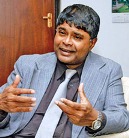By Prof. Rajiva Wijesinha M.P
Having now gone through the LLRC Action Plan, I can understand how sensible it was of the Cabinet to appoint, not politicians, but the Secretary to the President to work on it. And he in turn was inspired to appoint extremely competent public servants who would not be looking over their shoulders to see what political or personal fallouts their recommendations might cause.
It was also very sensible to have selected a couple of people who, in addition to their personal integrity to recommend them, have work experience that relates so closely to the major concerns of the LLRC report.
Land Commission
Not obviously coincidentally, these two Secretaries are perhaps the main contributors to the Task Force intended to expedite implementation of the National Human Rights Action Plan.
One of them also contributed seminally to its formulation, both by chairing one of the committees we had appointed in specific subject areas when the Ministry of Human Rights was preparing the plan, and then by contributing more actively than I think anyone else, when the Plan did not have a home as it were and the Attorney General kindly steered it through and gave us his rooms for meetings to produce a final draft.
Not coincidentally either, the two Action Plans have much in common. Though the LLRC Action Plan only mentions the HR Action Plan twice, it has been noted that there are I think 28 areas of congruence.
This must obviously be the case, for the LLRC strives to ensure a Rights based approach to problems that unfortunately have been canvassed more in terms of vindictiveness and self-justification.
Obviously in a situation of war, and especially one driven by a terrorist agenda, suffering will occur. Instead of engaging in atrocity snap, and engaging in blanket generalizations, we need rather to look at the suffering and strive collectively to assuage it.
One of the main concerns of the LLRC Plan is the issue of land, which had also been addressed in the HR Plan.
The scope there is more limited, for it deals primarily with the rights of the displaced, but in discussing the issue we had realized that policy decisions in related areas were also needed.
At a meeting a couple of months back with the Secretary to the Ministry of Lands, we realized however that he had the matter well in hand, and had taken steps to reach decisions by consensus, given the need under the 13th Amendment to consult Provincial Councils too.
Local communities
Most importantly, he was aware of the need to set up a Land Commission, which had been envisaged under the 13th Amendment, but which successive governments have failed to set up over a quarter of a century.
Incidentally, during the abortive discussions with the TNA, in what I think was the most productive period, when we were discussing land, the need for such a Commission was noted. After all, developing generally acceptable policies in such an area is best left, as with the LLRC report, for skilled administrators, rather than politicians who have always to be looking over their shoulders at their different constituencies. While the concerns of those constituencies must be understood, consensus on how to assuage all of them, or as many as possible, is best left to a representative body that is not engaged in winning political support.
One vital recommendation the LLRC made, which is embodied in the Action Plan, is that local communities be consulted.
I trust however that their suggestion of meetings for this purpose in each District Secretariat is expanded in implementation to incorporate Divisional Secretariat level meetings too. Having started initially with Reconciliation Committee meetings at District Secretariats, I soon realized that these were unwieldy, and the best unit for both consultation and instigating remedial action was the Division.
It is there that representatives of the community feel most confident about airing their problems, and it is officials at that level who can understand and look into those problems most efficaciously.
A second important recommendation is a seminar for the media to enable them to report accurately on the programme to be implemented.
This relates to a vital component of the Plan which takes up what the HR Plan had included, the need ‘to enhance parameters which will enable access to information’. The activity recorded there to be performed is to ‘Adopt legislation to ensure right to information’, and the LLRC Action Plan goes further in requiring ‘Cabinet to decide the suitable time frame for drafting legislation’.
Methods of communication
It would of course be a great pity if Cabinet decided that this meant it could decide on a prolonged time frame.
We must recognize that, as I have said in a paper on Emerging Challenges of Governance in South Asia, ‘The key principle should be that all the business of government should be known to the governed, unless there are compelling reasons to maintain confidentiality’.
In practical terms, given both the propensity for leaks in Sri Lanka, and the speed with which information travels given modern methods of communication, government is in danger of being threatened by campaigns of disinformation based on half-truths.
The best defence against this is total transparency, with regular and coherent briefing of the media.
I have dwelt at length on the land issue because, as the space devoted to it would make clear were we not already aware of the need to provide clear title to the manifold displaced, it is of crucial importance in bringing closure to protracted suffering.
This has unfortunately left me inadequate space to look at the other issue that looms large in the LLRC Action Plan, under the theme area of International Humanitarian Law issues. It will therefore be necessary to look at those, and some other issues, in a later article.
DBS
